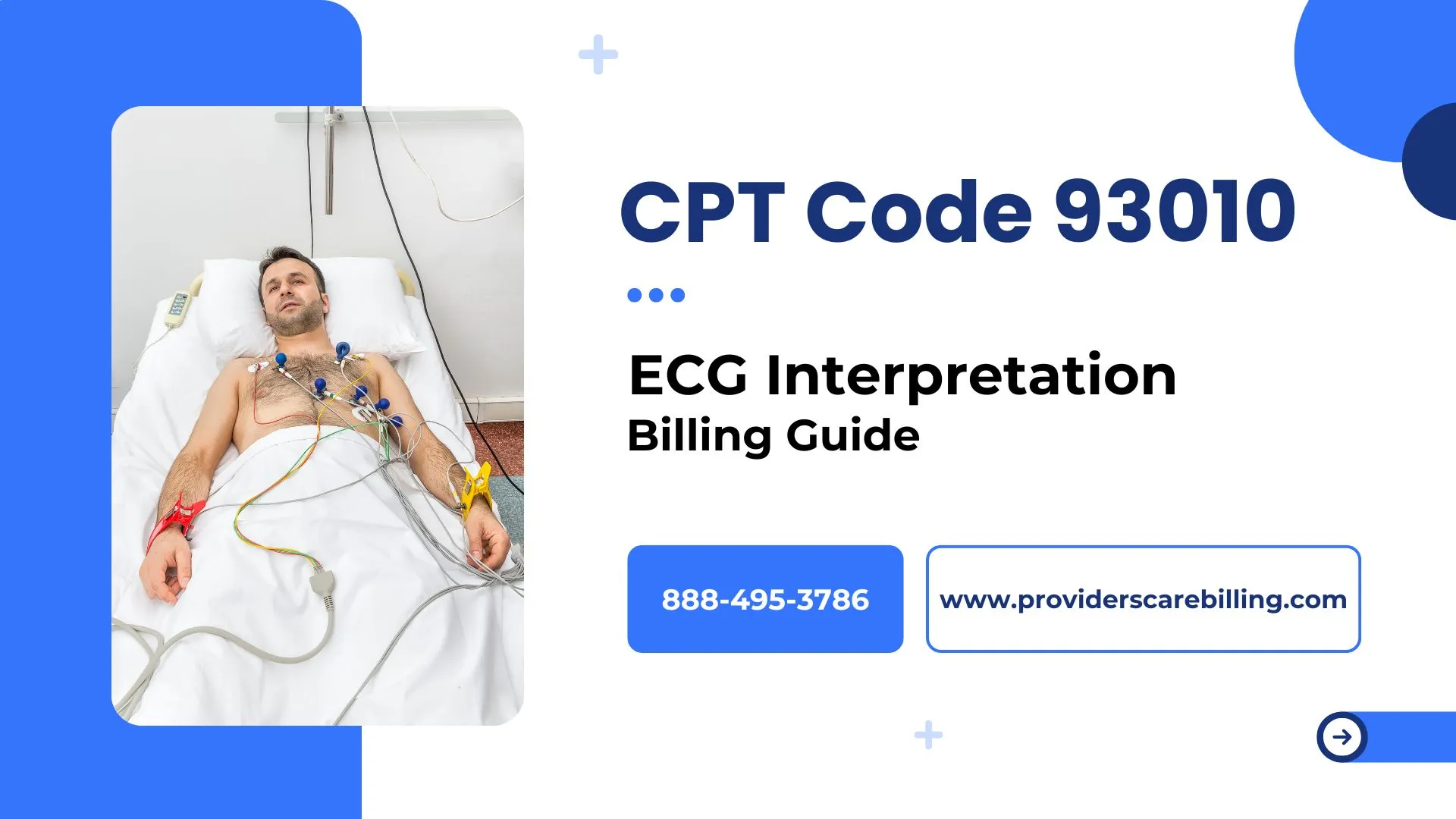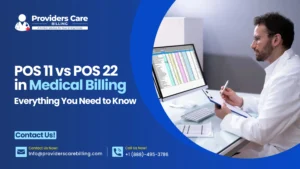CPT code 93010 is of importance in cardiology and in general medicine as it is the professional component of a 12-lead electrocardiogram (ECG or EKG). ECG-related services have to be billed correctly where there is increased cardiovascular disease prevalence to ensure payment is received, so care is not delayed because of revenue issues for the practice.
In this text, we will analyze the 93010 CPT code and provide some of the major reasons for claim denials, with some suggestions on how to use the Code 93010 billing guidelines optimally.
What is CPT Code 93010?
Code 93010 pertains to the interpretation and report of a 12-lead ECG. The healthcare professional will interpret the ECG and prepare a report, but will not conduct the ECG themselves; this is known as the professional component only. The description for the 93010 CPT code provided by the American Medical Association states: Electrocardiogram, routine ECG with at least 12 leads; interpretation and report only.
Not equally important is the fact that 93010 should not be associated with 93000 because the latter includes both the technical (tracing).
Why Correct Use of CPT 93010 Matters
Many providers seem to incorrectly bill 93010 without providing necessary documentation or in cases where it is not separately reimbursable. Most denials come from:
· Missing or vague documentation
· Lack of medical necessity
· Incorrect application of modifiers
· Billing both technical and professional work when only one is needed.
These errors result in a loss of revenue alongside an increased administrative burden as well as compliance risk.
CPT 93010 vs Other ECG Codes
Understanding of the particulars associated with the different codes within electrocardiogram procedures helps reduce the chances of the most common errors being made:
| CPT Code | Description |
| 93000 | Completed ECG of the heart; includes getting the reason, concluding, and reporting |
| 93005 | ECG tracing only, without interpretation |
| 93010 | ECG interpretation and report only |
| 93040 | Rhythm ECG with interpretation and report |
Documentation Necessities for 93010
Strong paperwork for the 93010 CPT code begins with precise entries in documents that don’t create any confusion. Adding the following to your documents will speed up the payment process.
· Time and Date of the ECG
· Reason for the ECG (clinical indication) — e.g., chest pain, arrhythmia, or shortness of breath
· Detailed interpretation – the rhythm, rate, axis, intervals, waveforms, and any existing abnormalities
· Conclusion/Impression
· Provider’s signature and credentials with date
Failure to incorporate these steps will result in the denial of the claim due to a lack of proper documentation. CPT code 93010 description requires a standalone report, which is unique from other parts of the patient’s chart and easily distinguishable.
Medical Necessity: Correspondence with ICD-10 Codes & Codes Policies
Insurance companies frequently do not authorize reimbursement for code 93010 due to claimed medical necessity. To mitigate this, try the following steps:
· Integrate the CPT code for EKG with the relevant ICD-10 diagnosis code mapping.
· Mention the reason for proceeding with the ECG, document precisely (chest pain should mean R07.9)
· Routine or Pre-surgery ECGs are unlikely to be reimbursed in the absence of the patient’s symptoms or other confirming indicators that justify the test.
CPT 93010 Billing Rules and Modifier Application
Correct application of modifiers where needed enables billing of CPT93010:
· Modifier 26 (Professional Component) – use to state your part performed if reporting this with a global code like 93000, in the CPT 93010, the professional component is already included, so don’t mention any modifier.
· Modifier 59 (c) use minimal and only when the ECG is truly separate from other bundled list of services, like during a cardiac catheterization or ER visit.
Common Denial Reasons and Solutions
| Denial Reason | How to Prevent It |
| Missing provider signature | Make sure to interpret the provider’s signs and dates on the ECG report |
| Lack of medical necessity | Use correct and definite ICD-10 codes that support the ECG performed |
| Billing technical + professional separately | Bill 93010 only applies when you are not included in tracing |
| Routine EKG with no documented reason | Mention the symptoms or indications supporting the ECG |
CPT-specific notes based on payer guidelines
Make sure to follow all the guidelines set by individual payers regarding CPT 93010. For example:
· Medicare, as well as many commercial payers, will not pay for reimbursement if an ECG is performed without documented necessity or justification.
· Blue Cross NC, for example, stipulates that ECG reports must be presented as individual documents and that each report contains all report constituents.
· Usually, for some payers, ECG interpretation done as part of the Emergency Room Management pays as a bundled service under the E/M Category unless Clearly justified as a standalone service.
Best Practices to Prevent Denied Claims
· Audit your ECG documentation: Ensure all necessary components are included and document outlines are user-friendly within the medical record.
· Educate your staff: Billing and coding personnel should have a basic understanding of ECG billing protocols and changes within Code 93010 billing policies.
· Make Checklists: A Comprehensive modifiers check, scope of procedure, and code accuracy verification is conducted before submission
· Check and update policies: Changes may easily occur depending on insurer type and patient setting, and frequently by the providing institution’s policies, so keep yourself updated.
If you’re working in mental health billing, this might help you: explore our guide on Psychiatric Evaluation Codes 90791 and 90792 to ensure accurate reimbursement.
Final considerations
Billing for the 93010 CPT code means Interpretation of 12-lead ECGs is often mistaken to be a simple, straightforward process, but can prove costly in the long run. Understanding the importance of proper documentation, medical necessity alignment, correct pairing of related codes like 93000 is very important to avoid denials.
Healthcare practitioners can follow the billing procedures for cardiovascular care services provided under CPT 93010 and improve compliance, reduce errors, and provide prompt reimbursement. Best practices around code 93010 decrease both administrative burden and financial risk when billing for an EKG interpretation in a clinic, hospital, or emergency room.
Pro tip
Contacting a professional billing company will reduce your burden and help you by coding the services properly to avoid any denials or marking you for audits. These professionals will help you to get the claim on time and the claim that you actually deserve.





